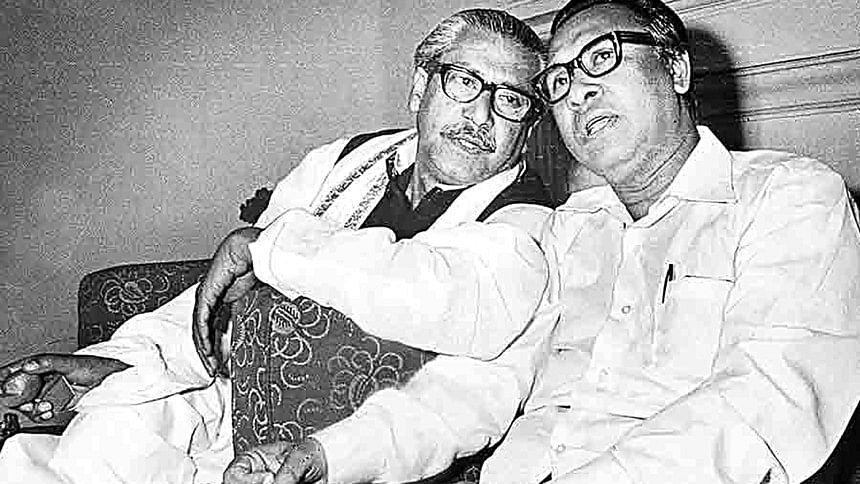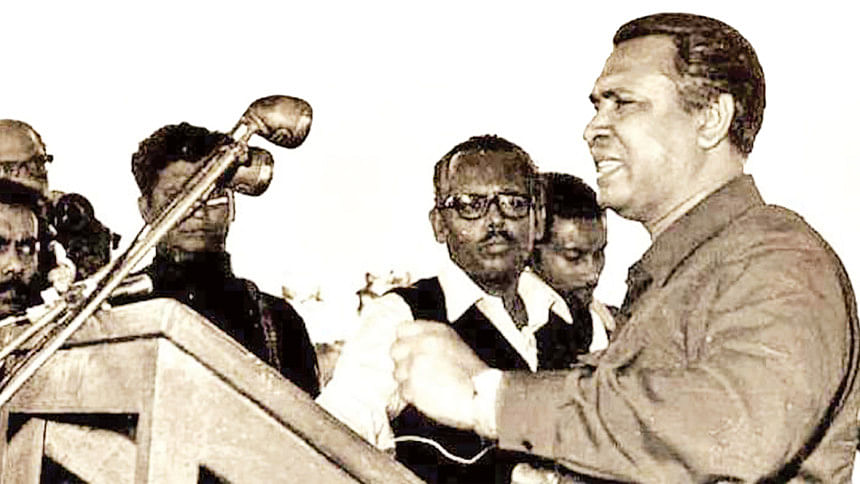Our finest representative of liberal politics

I did not personally know Tajuddin Ahmad, but he was a contemporary of ours, and the politics he practised was within the Awami League—though there were different strands within the party. One faction was the right-wing, represented by Khondokar Mostaq Ahmad, and another faction was more liberal, even significantly liberal. Tajuddin Ahmad belonged to the liberal faction. Sheikh Mujibur Rahman maintained ties with both sides, but toward the end, since the Liberation movement had taken shape, he had to move in the direction of the liberal faction.
Sheikh Mujibur Rahman even described himself as a socialist—specifically, a national socialist. Tajuddin, however, never described himself as a socialist or national socialist in that sense. Yet, during the Liberation War, three principal ideas emerged—secularism, democracy, and ultimately socialism. Tajuddin Ahmad supported all three, and the government established under his leadership embodied these three principles. Nationalism, however, was not yet a prominent part of the discourse at that time.
Nationalism came later—after the Liberation—and it was Sheikh Mujibur Rahman who introduced it. Tajuddin, in that sense, stood as a secular democrat whose ultimate position inclined towards socialism. And the historical role he played was something that had been imposed upon him; he hadn't prepared himself for it.
Of course, he had been involved in politics since his student days, but not in the sense of being deeply embedded in student politics. Rather, he was directly involved in mainstream politics from the very beginning.
Many of Tajuddin's friends were socialists and were affiliated with the Communist Party. But Tajuddin never joined the Communist Party himself. One possible reason for this might be that he wanted to pursue a kind of politics that could nationally reflect or represent the public's sentiments, demands, and problems.
And when he crossed the border into India, he didn't go as a fugitive seeking shelter or refuge. He went as a political leader—a leader of the Awami League and an elected representative. That's how he wanted to present himself. When he spoke with Indira Gandhi, he made it clear: "We will take your help, but this is our struggle, and we will fight it ourselves. We ask for your assistance, and if needed, we will take loans from you—which we will repay."
At that moment, Indira Gandhi was facing two major challenges. First, the massive influx of refugees from East Pakistan had become extremely difficult to manage. Second, there was the humanitarian question—people were engaged in a struggle, and it was necessary to politically support that struggle.
There was also a political dimension from the Indian point of view. On one hand, it was a humanitarian refugee crisis. On the other, politically, India had antagonistic relations with Pakistan and wanted to weaken it. This situation presented an opportunity—a war could break out, and through that confrontation with Pakistan, perhaps Pakistan would collapse altogether.
Indira Gandhi had another political objective: in India—especially in West Bengal—the Naxalite movement had become increasingly intense. Suppressing that movement was also one of her goals. And she was able to use both Bengali nationalism (as it emerged in Bangladesh) and Indian nationalism to suppress it, which served her political objective.
Another anxiety Indira Gandhi had at the time was that if this Bengali nationalist movement gained further momentum, there might be attempts to unify the two Bengals. The narrative was: Bengalis are being attacked here, Bengalis are taking refuge there, and many of those taking shelter in West Bengal had already migrated earlier and established roots there. So, her concern was: what if Bangladesh and West Bengal, both Bengali regions, start to move toward unification? That anxiety intensified at the time, and a certain kind of nationalist sentiment began to rise.

At that time, a flag of Bangladesh had been designed. The flag had a red circle in the middle, and within the red circle was a map outlining the region of Bangladesh. Tajuddin was carrying that flag with him. When Indira Gandhi saw it, he told her, "What we are trying to achieve is this—nothing more, nothing beyond this. This is our land—and that's how we want to define it."
This moment captures the uniqueness of Tajuddin's leadership during the war. He had to negotiate with the Indian government under difficult circumstances. At the same time, he faced internal opposition within his own party—some factions even issued a vote of no confidence against him.
Yet, he continued to lead the Liberation War. He had to coordinate not only with political allies but also with military generals who were part of the liberation effort. So, he was navigating pressure from all sides—internal, regional, and international. And amid all this, he served as the spokesperson for Bangladesh.
He was constantly communicating with international correspondents, and what stands out is how calmly and steadily he managed all this. One particularly unique aspect was that he had no family life during that time. Others who had gone abroad were accompanied by their families, but Tajuddin lived entirely alone. This solitary existence—working alone, thinking alone, carrying the weight of leadership alone—is almost unprecedented in our history. He had an exceptionally clear head.
After the Liberation, Tajuddin had a specific vision: he wanted to absorb the Mukti Bahini (freedom fighters) into a national framework, rather than making the state depend entirely on the military. That was his plan. He did make efforts towards this, but ultimately, he couldn't implement it. That failure wasn't due to a lack of trying—it was because his government didn't support him in this endeavour.
He was also very firm on one principle: whatever assistance he received from India, he would repay it. He was clear that he would not take anything as charity. He was strongly opposed to accepting loans from imperialist countries. At the time, the World Bank was a powerful actor, but Tajuddin refused to accept aid from them. He actively obstructed those efforts. Even when the Americans and the World Bank wanted to provide aid, he declined.
Secondly, since Tajuddin took on leadership during the war, there was naturally an element of jealousy from Mujib's side—along the lines of: "I wasn't here, and he's doing this work during the 1971 war."
Then, those followers known as the Mujib Bahini were actually formed by the Indian government. The Indian government created them but did not inform Tajuddin. This group was anti-leftist; their objective was that if Sheikh Mujib could not return, they would control the movement. Even if Mujib did return, they wanted to ensure that the leftist elements would not gain influence or power. That's why they restructured the Mujib Bahini.
Tajuddin, however, did not approve of the Mujib Bahini at all. Their ideology was different, and the difference between the Mujib Bahini and Tajuddin reflects Tajuddin's political outlook and ideology.
The Mujib Bahini was anti-leftist, and their main purpose was to prevent leftists from gaining power or leadership roles by any means. Tajuddin, on the other hand, was liberal and tried to accommodate everyone.
Sheikh Mujib's followers convinced him that Tajuddin would become his rival and try to take away his power. So, Sheikh Mujib was urged to remove Tajuddin. Interestingly, Sheikh Mujib never wanted to go to Mujibnagar—the place regarded as the provisional government headquarters during the Liberation War. He also never showed much interest in knowing the detailed story or history of the struggle. This was a weakness of his.
If Mujib had taken that leadership himself during the 1971 war, it might have been different. But Tajuddin never saw himself as a rival to Sheikh Mujib. He always respected Sheikh Mujib, calling him "Mujib Bhai", and wanted to remain under his leadership. He was never a "first man" type of leader. Instead, he wanted to be the party secretary, and as secretary, he was respected and accepted.
Ironically, the people who came to power after Sheikh Mujib's assassination identified Tajuddin as their number one enemy—and that is why they killed him.
One thing that stands out is that Tajuddin never went to India as a refugee; he went as a political representative of Bangladesh. In August 1975, when the anti-liberal forces took over—especially through the army—his friends advised him to leave the country. They warned him that those now in power would not tolerate him. But just as he had stayed in the country during 1971, he chose to stay again, even five years later. He refused to flee.
His friends told him that at the very least he could take shelter in India, where he would be safe. But he remained—and was arrested and then killed. He was our finest representative of liberal politics.
But perhaps the greater tragedy was not just his death, but the fact that after Liberation, he was pushed aside. His experience, his vision—none of it was reflected in the post-war governance of the country. He wasn't forced out; he voluntarily stepped aside once he realised he was no longer wanted. He didn't join JASAD either, although they had invited him. He didn't associate with them or any other party.
He remained committed to the liberal politics within the Awami League—even when right-wing forces, including Khandakar Mushtaque and elements of the Mujib Bahini, began to dominate. Some parts of the Mujib Bahini later drifted towards ultra-leftist politics, but Tajuddin was not comfortable with them either.
He knew he could have become President. But he deeply loved Sheikh Mujib—he considered him like an elder brother. While others began calling him "Bangabandhu," Tajuddin continued to refer to him as "Mujib Bhai." If anyone was truly equal to Mujib in terms of integrity, sacrifice, and vision, it was Tajuddin. And perhaps that's why a certain kind of jealousy grew around him.
Tajuddin Ahmad shared a very intimate relationship with Maulana Bhashani. During the 1954 elections, Maulana did not initially support the United Front (Jukto Front), as he observed that elements of the Muslim League had infiltrated it. Sheikh Mujib, too, was reluctant at first, but eventually, both accepted the United Front.
During the election campaign, Maulana Bhashani personally came to Tajuddin's constituency to campaign for him—something we do not hear of him doing for others. That constituency was considered dangerous and hostile, with armed elements active in the area. It was so inaccessible that Maulana had to be taken there on the back of an elephant.
He personally campaigned in support of Tajuddin Ahmad, despite usually campaigning more broadly against the Muslim League rather than endorsing individual candidates. In Tajuddin's case, however, it is well known that he made an exception and personally supported him.
Professor Serajul Islam Choudhury is an eminent intellectual, thinker and writer.

 For all latest news, follow The Daily Star's Google News channel.
For all latest news, follow The Daily Star's Google News channel. 



Comments